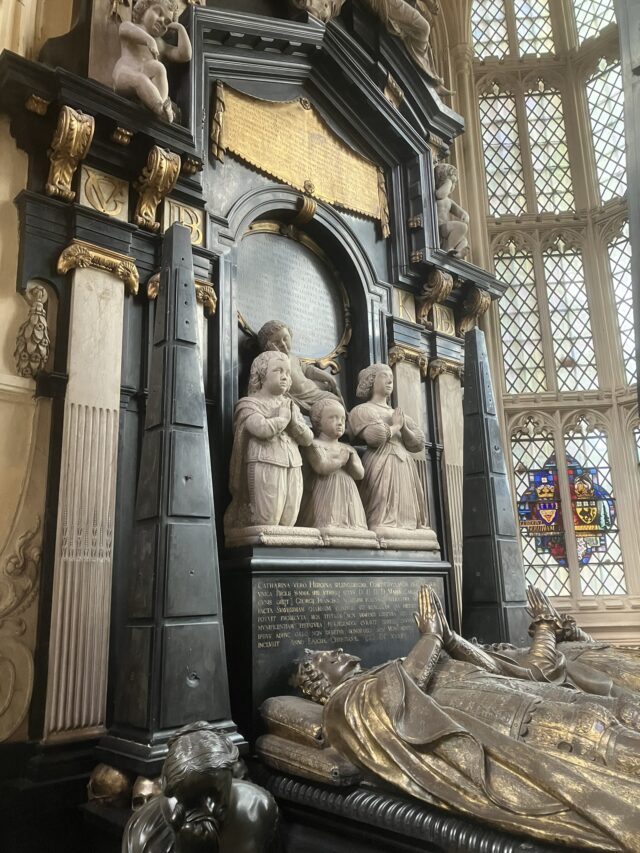Villiers, George (Duke of Buckingham)

In Latin: In perpetual memory of the most high and mighty prince George Villiers, Duke, Marquess and Earl of Buckingham, Earl of Coventry, Viscount Villiers, Baron Whaddon, Lord High Admiral of England, Ireland and Wales, Master of the Horse, Warden of the Cinque Ports, Constable of Dover Castle, Chief Justice in Eyre of the Parks and Forests south of the river Trent, Constable of Windsor Castle, Member of the Privy Council, Knight of the Most Noble Order of the Garter, President of the Council and Chancellor of the university of Cambridge. So memorable a hero was he; highly endowed in both body and mind; the intimate in turn of two most powerful sovereigns, he was famous in peace and war; most famous in the arts; he was a magnificent patron of letters and literary men; of inexhaustible generosity to any worthwhile project, he was unrivalled for his singular humanity and the agreeable nature of his manners; his life was terminated by the most frightful and terrifying murder; to common envy (which is always the partner of virtue and honour) he fell an innocent and undeserved victim.
Catherine, most glorious demi-goddess, daughter and sole heiress of the Earl of Rutland, was made by him [i. e. Buckingham] a most joyful mother of children of the greatest promise and of either sex: Lady Mary, Lord Charles (who died in earliest childhood), Lord George, and Lord Francis his youngest and posthumous child. She honoured the most sweet memory of her dearest husband with all possible piety and respect, and saw to it that these titles should be appended, not to satisfy vanity, but to attest the generosity of the greatest Princes: and most sorrowfully enclosed within this monument, which honours him, his sad remains and whatever of him is not yet due to heaven, in the year of the Christian epoch 1634.
Sacred to his dear memory: here he lies, a reproach to the fickle mob: however, Spain marvels at his prudence, France at his courage, Belgium at his diligence, and the whole of Europe at his magnanimity: who was known by the kings of Denmark and Sweden to be irreproachable, by the princes of Germany, Transylvania and Nassau to be upright, by the Venetian Republic to be a lover of monarchy, by the dukes of Lotharingia and Savoy to be a statesman, by the Count Palatine to be loyal, by the Emperor to be a peace maker, by the Turk as a Christian, by the Pope as a Protestant: whom England regarded as Lord High Admiral, Cambridge as Chancellor, and Buckingham as its Duke.
Now stay, O passer by, and hearken to what even Envy herself cannot mock. Here is great Buckingham, a man of disastrous virtue: a loving husband, an affectionate father, an obedient son, a most kindly brother, a generous kinsman, an abiding friend, a beneficent lord, a nobleman who was the servant of all: whom kings loved deeply, whom the nobility held in honour, whom the Church lamented, whom the multitude loathed: whom James and Charles, most perspicacious of monarchs, regarded as their intimate friend, adorning him with honours and burdening him with commissions: he succumbed to Fate before he found a danger to match his courage.
What then, O stranger? The riddle of the world is dead. He was all things, yet had nothing: named his country's father and its foe: both the delight and the plaint of Parliament: who, while he was waging war against the Papists, was accused of papacy: while promoting the Protestant cause, was slain by a Protestant. Behold the dice of human fortunes. Yet it is not the case that malice shall truly triumph: it was able to kill him, but not to harm him: he who at the moment of death poured forth these prayers: Let me receive thy blood, my Jesus, while the wicked feast upon mine. [Translation courtesy of Westminster Abbey website, adapted.]
Church: Westminster Abbey (in Westminster, London).
Sex:
Male.
Virtue(s):
Affection, Benevolence*, Blamelessness*, Constancy*, Courage*, Diligence, Famed*, Generosity*, Good child, Good friend, Good manners, Good parent, Good relation, Good sibling, Good spouse, Greatness*, Heroism, Honoured*, Humanity*, Intelligence*, Kindness, Love, Loyalty, Magnanimity*, Obedience*, Orthodoxy*, Peaceableness*, Philanthropy*, Pleasantness*, Prudence, Uprightness, Virtue.
Afterlife:
Known.
Language:
Latin.
Year of death: 1628.
Year of headstone: 1634.
Age at death: not given (classed as: Adult).
